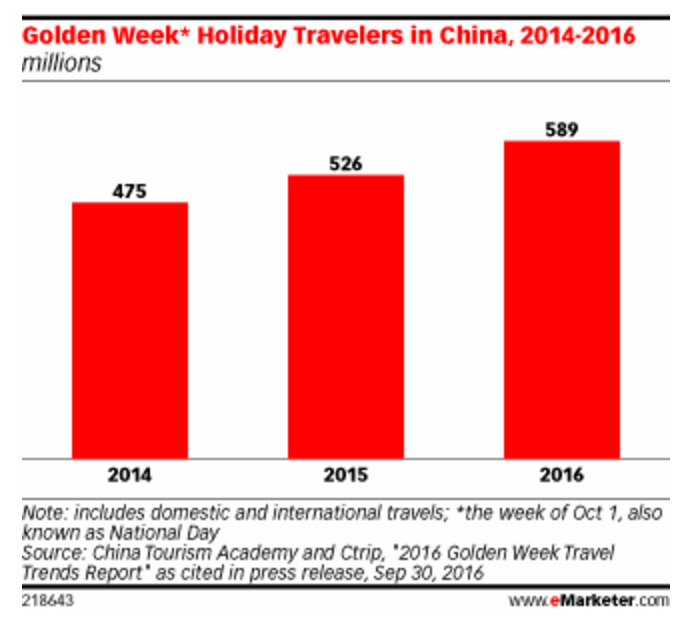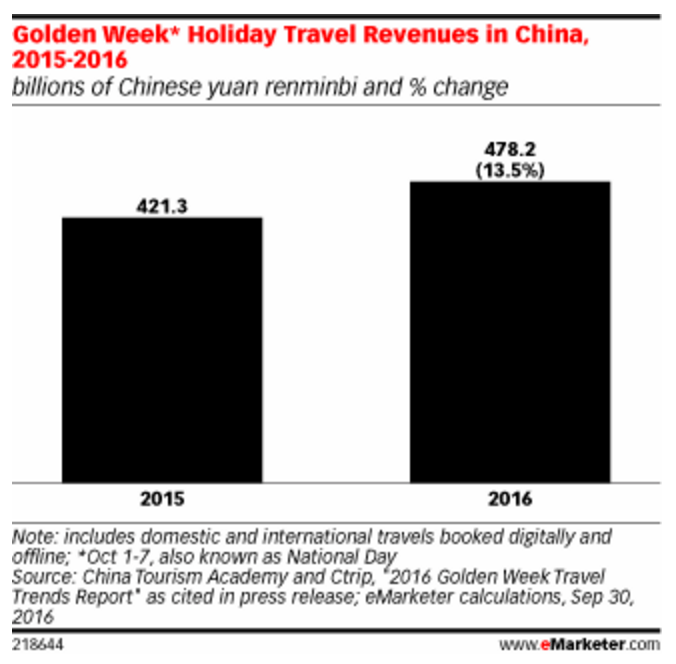Skift Take
There's no doubt China's economy is going through a downturn, but western travel brands can't blame all of their shortcomings on that point. Much of foreign travel brands' failures or missteps in China -- such as Airbnb or Uber for example -- are probably more likely because they couldn't execute strategies that fit the Chinese market.
Claims that a weaker Chinese economy has negatively impacted travel demand in China have jockeyed with financial headlines across Asia this year.
But it always helps to check the numbers — the latest data show that not only is the Chinese travel industry alive and well, it’s also having its best year ever and 2017 is on track to be even better.
Some 589 million Chinese travelers took domestic and international trips during this year’s Golden Week in China, which fell from October 1 to 7, according to data from Ctrip, China’s largest online travel agency and the world’s second largest, and the Chinese Tourism Academy, a Chinese government tourism arm.
That’s a 12 percent year-over-year increase in the number of Chinese travelers that traveled around China or abroad compared with last year’s Golden Week and a 24 percent increase from the 2014 holiday. The Chinese government created Golden Week in 2000 to grow domestic and international tourism, the latter being pushed especially hard with this year’s China-U.S. National Year of Tourism.
Golden Week is big business in China and the main period when Chinese domestic and foreign trips take place each year. Not to mention it’s one of the world’s single largest annual movements of people, and it’s a great measure of the health of Chinese travelers’ discretionary spending strength.

Source: Chinese Tourism Academy and Ctrip
China is the world’s largest outbound travel market and one of the largest for domestic tourism. The data don’t imply it’s been a banner year for all travel brands in China, particularly U.S. and other western brands like Airbnb and Carnival Corp., but it does discredit any assertions that China’s economy has put a major damper on its travel industry.
Disney claims attendance at its new Shanghai resort, which opened in June, has exceeded expectations, despite contrary reports.
China’s travel industry has shown rapid growth in the past six years, ballooning to more than 130 million outbound travelers this year from about 70 million in 2010.
While Golden Week is only a snapshot of the total number of Chinese travelers that took trips so far this year, year-to-date revenues from travel brands in China are also significantly above last year. Both Ctrip and the Chinese Tourism Academy found travel brands in China have netted 478.2 billion Chinese yuan ($80 billion) in revenues so far this year, 13.5 percent more than last year’s 421.3 billion yuan ($62.1 billion).

Note: Chart is showing Chinese yuan renminbi, not U.S. dollars.
Source: Chinese Tourism Academy and Ctrip
eMarketer, a New York City-based market research company, estimates that although China’s travel revenue will continue to climb and jump from $95 billion in 2016 to more than $120 billion in 2017, a 30 percent increase.
Growth in mobile bookings has been fueling many of these travel bookings as most Golden Week travel purchases were made on mobile devices. “Nearly two-thirds of digital travel bookings on Ctrip’s network were made on a mobile device, with desktops and laptops making up the other third,” said eMarketer’s analysis of the data.
The Daily Newsletter
Our daily coverage of the global travel industry. Written by editors and analysts from across Skift’s brands.
Have a confidential tip for Skift? Get in touch
Tags: china, china outbound, ctrip
Photo credit: Some 589 million Chinese travelers took domestic and international trips during this year's Golden Week in China. Pictured are Chinese tourists at Gardens by the Bay in Singapore. Dan Peltier / Dan Peltier, Skift
